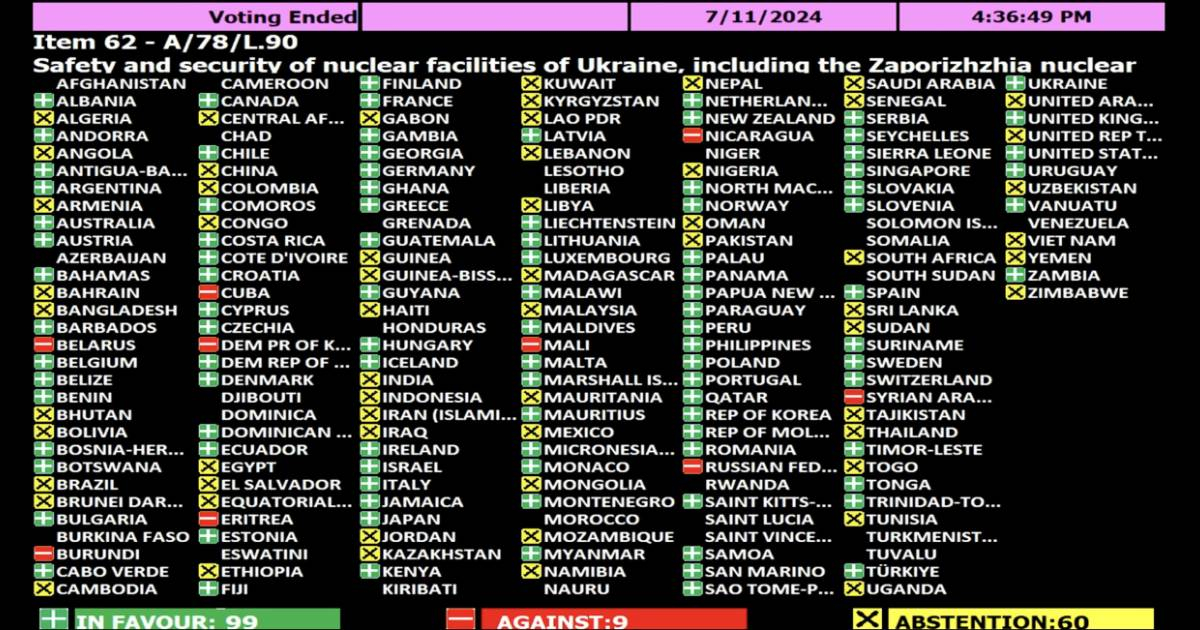The Cuban regime cast a vote at the United Nations General Assembly (UNGA) opposing a motion for Russia to vacate nuclear power plants occupied in Ukraine. The UN body adopted a resolution demanding that the Russian Federation immediately return control of the Zaporiyia nuclear power plant to Ukrainian authorities to ensure its safety. The resolution passed with 99 votes in favor, nine against, and 60 abstentions.
Among the countries voting against the resolution were Cuba, alongside Belarus, Burundi, North Korea, Eritrea, Mali, Nicaragua, Russia, and Syria. The Cuban delegate voiced dissatisfaction with what she described as a lack of inclusive process in drafting the resolution. She added that the Cuban delegation would have proposed amendments if given the opportunity to consider other perspectives.
According to the Cuban delegation, the draft does not facilitate cooperation and undermines essential principles of nuclear safety. The UN resolution demands that Russia withdraw its military and unauthorized personnel from the nuclear plant and grants the International Atomic Energy Agency (IAEA) Support and Assistance Mission full and timely access to all areas critical for nuclear safety at Zaporiyia.
Additionally, the resolution condemns Russia's non-compliance with relevant UNGA and IAEA resolutions and calls for an immediate halt to Russian attacks on Ukraine's critical energy infrastructure.
Reactions from Ukraine and Russia
The Ukrainian representative, while presenting the resolution, recalled Russia's armed attack on the Zaporiyia plant and emphasized Ukraine's longstanding commitment to nuclear safety. He also highlighted Ukraine's cooperation with the IAEA and condemned Russia's refusal to comply with the resolutions, which he argued violates fundamental nuclear safety principles.
The Russian representative, on the other hand, claimed that Russia regularly provides data on the situation at the plant. He criticized the non-inclusive and non-transparent methods used to draft the resolution and urged states to vote against what he called a harmful initiative that is "disconnected from reality."
The Syrian representative also criticized the resolution as highly politicized and poorly transparent. Meanwhile, the South African representative, who abstained from voting, praised the IAEA's efforts and argued that technical matters are more appropriately within its domain.
Other countries such as Mexico and China, which also abstained, stressed the importance of preserving the integrity of nuclear facilities and the need to resume dialogue to reach a political solution to the conflict in Ukraine. Despite the "politically motivated" elements of the text, the Ghanaian delegate explained their vote in favor, hoping it would serve as a practical expression of the international community's collective desire for peace.
Representatives from Qatar and Jordan also voted in favor, supporting regional and international efforts to resolve the conflict. Since the beginning of the war in Ukraine, the regime in Havana has consistently supported Russia, its long-time political ally, in all international bodies condemning Moscow's invasion, despite the Cuban population's rejection of the conflict, which has resulted in the deaths of dozens of Cubans recruited by the Kremlin.
Key Issues in the Ukraine-Russia Conflict
In light of the recent UNGA resolution and the ongoing conflict in Ukraine, several key questions have emerged regarding the positions and actions of various countries involved. Below are some frequently asked questions and their answers.
Why did Cuba vote against the UN resolution on Zaporiyia nuclear plant?
The Cuban delegate expressed dissatisfaction with the lack of an inclusive process in drafting the resolution and believed it did not facilitate cooperation or uphold essential principles of nuclear safety.
What does the UNGA resolution demand from Russia regarding the Zaporiyia nuclear plant?
The resolution demands that Russia withdraw its military and unauthorized personnel from the nuclear plant and grants the IAEA full and timely access to all areas critical for nuclear safety at Zaporiyia.
How has Ukraine responded to the resolution?
The Ukrainian representative emphasized Ukraine's commitment to nuclear safety, highlighted cooperation with the IAEA, and condemned Russia's refusal to comply with the resolutions.
What are the implications of Cuba's consistent support for Russia?
Cuba's consistent support for Russia, despite international condemnation of Moscow's actions, reflects its long-standing political alliance with Russia and has led to domestic discontent given the losses suffered by Cuban nationals in the conflict.
